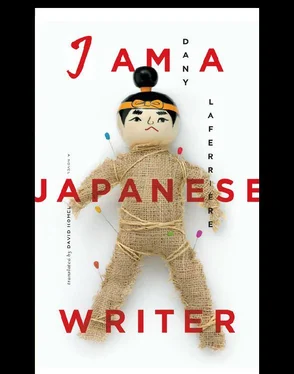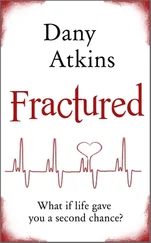“‘I am a Japanese Writer.’ But that’s only the title.”
“Oh, man! You couldn’t have picked a better time. They’re into this really big identity debate over there, and all of a sudden you come up with a book like that.”
“There is no book — that’s what I’ve been explaining to everyone.”
“That doesn’t matter. They’re completely obsessed with identity, I’m telling you.”
“I don’t give a shit about identity.”
“So you say, but then you write a book with a title like that. What does that mean?”
“It means I did it to get away from the whole business, to show that borders have disappeared. I was tired of cultural nationalism. Who says I can’t be a Japanese writer? No one.”
“That’s exactly where the debate gets interesting. In Tokyo, a lawyer has claimed he can get an injunction against your book.”
“Midori, look at me. Look me in the eye: there is no book.”
“I’m telling you who’s saying what in Tokyo, and you keep coming back with Montreal stuff. I need work. Now I have a photo contract, and afterwards, who knows, maybe I’ll do something in film. I could sing. For an American girl or a French woman, it’s easy to make a name in Japan, but if you’re a Japanese girl living overseas, you’re screwed.”
“Sure. But you just told me you didn’t want to live in Japan.”
“That changes if Kara is calling, and it’s a short-term project. The latest news, my girlfriend told me, is that this lawyer got on tv and said that the word ‘Japanese’ belongs to the Japanese government, who should bestow it only on its legitimate citizens. Not anybody can become Japanese just because they want to. And another lawyer who wanted to be smart — it was a televised debate with a bunch of lawyers — asked whether a serial killer from some other country could publish a book called ‘I Am a Japanese Serial Killer.’ That would sully Japan’s reputation. That show was on a real popular channel, and it set off an uproar among the Japanese right.”
“‘The Japanese right’? Aren’t they all on the right?”
“If you go there, be careful, the issue is no laughing matter for them. Some nationalist publishers, the ones who publish mostly ‘novels of the soil,’ signed a manifesto not only to protest against your book coming out in Japan, but anywhere in the world.”
“They’re crazy!”
“The funniest thing is, a major critic from the biggest daily paper in the country said that the reputation of all Japanese writing would be in danger if your book turned out to be bad. With that title, it’s as if the writer had become — and I quote— ‘the Japanese writer par excellence. ’ Foreigners might well avoid Japanese literature if they don’t like your book.”
“I didn’t say I am the Japanese writer. I said I am a Japanese writer. It could be good or it could be bad.”
“I can see you don’t understand Japanese nationalist sensitivities. And a black man on top of it… That’s what interested Kara. And here I am.”
“You know the book hasn’t been written yet.”
“But its impact is real. People might be disappointed if you wrote it.”
“Maybe, but I don’t care about their feelings. Why does this guy want pictures?”
“Kara doesn’t want any real contact with you. For him, the whole thing’s a fantasy. In the end, he might turn you into an eighteenth-century samurai. He does what he wants to. He’s an artist. My girlfriend told me she’s seen him a lot lately, she knows him real well, and that’s all he talks about. He calls up everybody at two in the morning and goes on and on about it. He thinks there’s some kind of connection with the guy who ate the Dutch girl. For him, it’s all about metamorphosis. It has nothing to do with sex or cannibalism. The eater wanted to be something different — another gender. You want to be something else too.”
“Maybe Japan wants to be something else as well.”
“No. Japan just wants to be Japan. That’s the saddest part of it.”
Midori took a few more shots.
“Okay. I’ve got enough. I have to go.”
She hasn’t said so much as a word about Noriko.
A SPLENDID VIEW OF THE RIVER
I KNEW I had to move out of my room when a Japanese tourist, a magazine in his hand and a camera over his shoulder, came knocking at my door.
“Hello,” he said, with a beaming smile.
“Can I help you?”
“Are you the Japanese writer?”
“No,” I said, and closed the door sharply.
I pressed my ear to the door. I didn’t hear footsteps. I went to the bathroom and moved aside a piece of tile. That was my window onto what was happening in the hallway. A long line of people were waiting patiently — all of them Japanese. I left the rent money on the table. I pictured Zorba banging away at my door all night long, only to open it in the morning, muttering to himself, and discover the closet empty and the money waiting. I packed my bag and slipped out by the fire escape. I went down the alley where kids were running like crazy. Their mothers watched casually as they hung out their laundry, knowing that cars rarely came that way. Except for cop cars, which hid there sometimes. A spider feigning sleep, patiently awaiting its prey: I stopped just in time. I recognized the scar on the arm of the cop who’d recently paid me a visit. What was he doing here, right underneath my window? I didn’t move; I held my breath. He was sipping his coffee. He must have known I was home. Another cop got out to stretch his legs. They were the same age, with the same hard faces. Were they waiting for nightfall to make their move upstairs? I knew what would happen next. They would take me to some spot considered dangerous for the police, then rape me before using their nightsticks. If ever an accident happened (though they were too experienced to let that occur), they’d blame it on a settling of accounts among rival gangs. The city desk journalist would write what the cops told him, otherwise he could kiss his scoops goodbye. And a city desk reporter without a scoop is no better than a penniless mafioso on the run.
My intention is to live like Basho this time. Underneath a banana tree. But the winter is too harsh. I sleep here and there. Sometimes on a hot-air grate in front of a downtown building, a warm breeze on my back. Other times in the subway. If you don’t sleep two nights in a row in the same station, you can get away with it. The police keep a lazy watch. Sometimes I spend the night in the Voyageur station where the buses head out for the great American cities. I just say I’m going to New York or Chicago and they leave me alone. Watch out for your smell— it’ll give you away. The cops do their rounds at the smaller bus station (the main one is downtown and not to be recommended), sniffing at people to ferret out the scent of poverty. Here, race isn’t much of an issue (we all belong to the loser race); smell determines everything. And it’s not easy getting rid of that smell, believe me. I go for a shower at the SaintVincent de Paul. I soap myself down till the smell disappears. I put on a clean shirt. Everything goes according to plan until I start sweating. I’ve got a trick: I replace the identifiable smell of poverty with another one. I go and I sit in front of the Da Giovanni restaurant until the smell of spaghetti fully permeates my skin. I want to change smells.
It’s easy to find something to eat in a big city: you follow the first guy you see walking south with his head down. South is always poorer than north. The man led me to the docks. He sat down and looked at the boats. It was child’s play: the lapping of the waves, a few white birds attracted by the crumbs he was throwing. I stood there, knowing this wasn’t his final station. After getting his fill of the horizon, he stood up, adjusted his old bones and got back on the road. I followed him like a shadow. We all have an itinerary in a city. His was mine too. The difference is that I had chosen my path, while he was passive. I could tell by his slumped shoulders. He stopped a minute, turned around as if he suddenly felt he was being followed, then stepped through a doorway. I followed him in and discovered a giant room where all the city’s down-andouters seemed to have their meeting point. The place smelled like vegetable soup. It didn’t smell bad; it smelled of poverty. A smell of wet canvas and rotting fruit. A sweetish smell. We were in the bowels of the city. Someone motioned me forward. I hadn’t even noticed I had joined the ranks. There was one line and one menu. A nun was doing her best to make us feel at home. Everything came to a standstill. A man wanted two portions. Impossible, the nun told him with a sad smile. We don’t know how many people will be needing us. There were the usual visitors, then there were people like me who followed some miserable old guy, not realizing he was part of the slumped-shouldered crowd. My bowl of soup. I went and sat down in a corner near the window with a splendid view of the river. Two or three people burst out laughing. It’s always dangerous when poor people laugh. I spotted a shadow on the floor stretching out in front of my shoes. I looked up and discovered the exact reproduction of the Indian who acted in One Flew Over the Cuckoo’s Nest. I understood what he meant before he said it. I’d looked for the most uncomfortable spot and I’d found it. I was halfway through my soup when a man kneeled down in front of me. What did he want? My soul, I guess. It’s the last thing I had that I could sell. He took my measurements and assured me that next time, he would bring me a pair of boots so I could get through the winter with warm feet. Later the nun told me he’d been doing that for twenty years. No one knew his name. I wasn’t afraid of him, but of the guy he works for. What does he want from me?
Читать дальше












